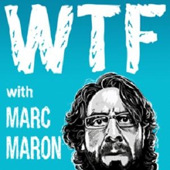Earlier this fall I started reviewing podcast episodes, and while I got a strong start, I realize the output has been a little meager lately. Reviewing podcasts is a bit like reviewing television programs – there’s a neverending supply every week of the year. Never the less, I don’t intend to stop listening and reviewing.
To finish out the year I want to share some of my favorite podcast episodes from 2012. This is not necessarily an absolute “best of” list. My selections are far too idiosyncratic. On top of that, there are far too many podcasts that I have not listened to. Therefore I cannot even begin to presume to have listened to the best podcasts this year in the first place.
These are the episodes I enjoyed listening to the most in 2012, and the ones I can most recommend for someone to check out, especially if one hasn’t already listened to the podcast series in question. They are not listed in any particular order.
Quit is a relatively new podcast that premiered in November, hosted by Dan Benjamin, founder of the 5by5 podcast network and producer of the productivity podcast Back to Work which I have reviewed. As one might tell from the name, Quit is a podcast about quitting a job, starting something new and the lessons that are learned. This podcast is a lot more like a radio show in that Benjamin takes live calls from listeners who share their stories of quitting and starting over, or who ask for advice about their current work situation.
On other 5by5 shows, like Back to Work, Benjamin tends to take an appropriate back seat to other hosts, keeping the programs moving and letting his co-hosts be the showcase. In contrast, on Quit Benjamin is front-and-center. It is obvious this is a topic he is passionate about, as a self-described former “corporate stooge,” who had series of corporate IT jobs before taking a couple of shots at starting businesses, until achieving some success with the 5by5 network.
With only five episodes so far, it’s a young podcast. But I think Quit has already started to hit its stride with episode #3. In particular I appreciated his discussion of success, sparked by the news that professional blogging pioneer Jason Calacanis had decided to shut down his own podcasting network because it had only been a “modest success,” which Calacanis argues is the enemy of massive success.
While Benjamin clearly advocates for striking out on one’s own, he also dispenses level-headed advice about taking that leap carefully, especially to callers who seem to be more impulsive than anything else. I will be curious to see if the podcast has legs, given the topic, though I think the call-in format will help keep it fresh and lively.
I have a bachelor’s degree in English literature, and yet I really don’t read as much literature, especially fiction, as I often think I should. Sometimes I think I got my fill in college. So I was a bit surprised when I enjoyed Literary Disco as much as I did. It’s also a relatively new podcast, having started in March. As the name might suggest, it is not a dry, bookish discussion about books. Instead, the three hosts, Julia Pistell, Tod Goldberg and Rider Strong, talk about literature with the same passion, fervor and occasional irreverence that one might expect from rock music critics. Yet, they manage to do this without patronizing the listener or over-intellectualizing the subject.
Episode #3 was my introduction to the podcast, on the recommendation of a friend, in which they take on the young adult novel series Sweet Valley High. Their re-reading of it is respectful of the place it had for young women who read it in the 80s, when the series was one of the hottest YA titles, while still casting a contemporary and critical eye on its faults. Having never read the SVH books myself it’s a testament to the hosts’ podcasting skills that I was engaged by their discussion, and then prompted to subscribe to the podcast.
 Notebook on Cities and Culture S2 E21: Kevin Sampsell
Notebook on Cities and Culture S2 E21: Kevin Sampsell
Colin Marshall is not just a podcast reviewer, but a podcaster himself. I came to his podcast Notebook on Cities and Culture after finding his podcast reviews. The podcast evolved from a public radio program, The Marketplace of Ideas, which aired on KCSB-FM from 2007–2011. On Notebook Marshall explores the interplay between culture and place, talking to people who are contributing to vibrant culture or studying that relationship. Marshall has funded the podcast using a Kickstarter campaign, helping him travel to cities to record his interviews on the ground. The campaign to fund the third season of Notebook concluded successfully on December 21.
Marshall is a sympathetic interviewer who brings out his guests without fawning, though I haven’t yet heard him challenge a guest on an unsupported assertion, either. At the same time, I’ve enjoyed every episode of Notebook I’ve listened to, so it was difficult for me to pick just one. But in terms of pure enjoyment, I have to pick episode 21 of season 2, with guest Kevin Sampsell, as part of his tour of Portland, Oregon, a city that I enjoy visiting regularly, myself. Sampsell is a novelist and publisher of noir fiction, and editor of the volume Portland Noir, full of dark stories about its namesake. Sampsell’s own stories, about his upbringing in Washington state’s semi-isolatedTri-Cities, how life eventually led to him taking root in Portland, Oregon, and how that city’s enormous “city of books” bookstore helped him become a more serious reader, are entertaining and will bring a smile.
 Triangulation #60 – Nolan Bushnell
Triangulation #60 – Nolan Bushnell
As a kid I was obsessed with computers and video games, as well as the stories of the pioneering entrepreneurs who emerged from Silicon Valley to create the personal computer and home video game revolution of the 1980s. Back then I read everything I could about Atari founder Nolan Bushnell, who famously employed a young Steve Jobs at the early Atari company. I thoroughly enjoyed his appearance on Leo Laporte’s Triangulation, which features many pioneering tech entrepreneurs. Even though Bushnell initially seems reluctant to cover the ancient history of Atari, veteran interviewer Laporte manages to ease him into an entertaining recollection, along side a discussion about what Bushnell is up to these days.
 Podcast Squared #127 – Chris Gore
Podcast Squared #127 – Chris Gore
I learned about Podcast Squared because producer Andrew Johnstone commented on my post about podcast reviewer Colin Marshall, to make sure I would know that he had been doing podcast reviews on his podcast for more than 2 years. I wish that I had been able to go to the LA Podfest, so I was glad to hear that Johnstone did and featured the event on his podcast.
I particularly enjoyed this freewheeling interview with podcaster Chris Gore who is also publisher of the long-running independent film magazine Film Threat. On Gore’s Podcrash podcast he actually crashes other podcasts. On this episode of Podcast Squared Gore discusses how he selects the podcasts that he crashes, which bridges into a lively discussion about what makes a good podcast. Given that they are attending a podcast conference, Gore also talks about what makes for a good conference panel. He says that panelists should be prepared to share freely, criticizing many filmmakers he’s seen at conferences who are reticent to share important details about how they find funding and how they really pull off producing a film.
In many ways this episode is really a how-to for podcasters, from someone who is enthusiastic about the medium, while also being a veteran of independent media.
It’s no secret that Marc Maron’s WTF is my favorite podcast. It’s also one of the most popular and well-known podcasts, and therefore receives quite a bit of press attention. That attention is well deserved, because Maron is a very good interviewer who consistently hones his hosting skills, and finds ways to catalyze fresh conversations even with guests who have been making the talk show and podcast rounds, by necessity telling the same anecdotes and stories.
I most enjoyed episode #300, which was both a reflection looking back at three years of podcasting, and an assessment of where he is now. Instead of one episode-length interview he talks with Nathan Rabin from the Onion’s A/V Club, which covers podcasting, and podcasting veteran and producer of Bullseye, Jesse Thorn, along with fellow comedian/podcaster Pete Holmes and comedian Andy Kindler. Maron’s ability to be self-critical while not letting go of his ego help to give the listener some true insight into what it takes to make a fresh start in a young medium.
Dr. Demento is a true radio legend, single-handedly making novelty records and other comedic recordings a genre to be respected, not merely pop-culture junk food. So the opportunity to listen to him engage in a long, unstructured interview is a true pleasure for any radio nerd. I wrote about this episode when it was released in August, and it’s well worth revisiting.






